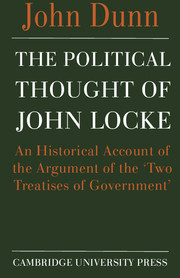 The Political Thought of John Locke
The Political Thought of John Locke Book contents
- Frontmatter
- Contents
- Preface
- AUTHOR'S NOTE
- Dedication
- PART I
- PART II
- PART III
- 8 The Premises of the Argument
- 9 The State of Nature
- 10 The Creation of the Legitimate Polity
- 11 Prerogative
- 12 Public Good and Reason of State
- 13 The Conditions for Legitimate Resistance
- 14 The Law of Nature
- PART IV
- PART V
- Bibliography
- Index
8 - The Premises of the Argument
Published online by Cambridge University Press: 05 April 2012
- Frontmatter
- Contents
- Preface
- AUTHOR'S NOTE
- Dedication
- PART I
- PART II
- PART III
- 8 The Premises of the Argument
- 9 The State of Nature
- 10 The Creation of the Legitimate Polity
- 11 Prerogative
- 12 Public Good and Reason of State
- 13 The Conditions for Legitimate Resistance
- 14 The Law of Nature
- PART IV
- PART V
- Bibliography
- Index
Summary
The entire cosmos is the work of God. He created every part of it for his own purposes and he created each part of it with a defined relationship to the purpose of the whole. It is an ordered hierarchy, a ‘great chain of being’, in which every species has its station, its rank. Almost the entire humanly apprehensible bulk of it obeys the laws, or may be thought to exhibit the sort of physical regularity, which Newton was shortly to demonstrate. It was a vast functionally integrated machine and all of its elements were to be construed in terms of this integrative picture. Yet, one element of this machine which could be apprehended by anyone did not seem very efficiently related to the rest and that element, embarrassingly enough, was the human species itself. Allotted a peculiarly exalted rank, but a little lower than the angels (who, as Milton classically described, had also shown certain defects in their sense of cosmic responsibility), in this divine project, one which demanded self-conscious voluntary co-operation, men had by historical mischance lost many of the privileges initially attached to their role and consequently been forced to endure distinctly less attractive working conditions.
All this may seem the purest banality but its banality is precisely its crude relevance to the project of setting out ‘the true original, extent, and end of civil government’ in answer to Robert Filmer. It constitutes the common backcloth to the performances of the two men.
- Type
- Chapter
- Information
- The Political Thought of John LockeAn Historical Account of the Argument of the 'Two Treatises of Government', pp. 87 - 95Publisher: Cambridge University PressPrint publication year: 1969


